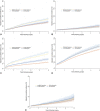Preoperative Depression Status and 5 Year Metabolic and Bariatric Surgery Outcomes in the PCORnet Bariatric Study Cohort
- PMID: 35058404
- PMCID: PMC9994793
- DOI: 10.1097/SLA.0000000000005364
Preoperative Depression Status and 5 Year Metabolic and Bariatric Surgery Outcomes in the PCORnet Bariatric Study Cohort
Abstract
Objective: To examine whether depression status before metabolic and bariatric surgery (MBS) influenced 5-year weight loss, diabetes, and safety/utilization outcomes in the PCORnet Bariatric Study.
Summary of background data: Research on the impact of depression on MBS outcomes is inconsistent with few large, long-term studies.
Methods: Data were extracted from 23 health systems on 36,871 patients who underwent sleeve gastrectomy (SG; n=16,158) or gastric bypass (RYGB; n=20,713) from 2005-2015. Patients with and without a depression diagnosis in the year before MBS were evaluated for % total weight loss (%TWL), diabetes outcomes, and postsurgical safety/utilization (reoperations, revisions, endoscopy, hospitalizations, mortality) at 1, 3, and 5 years after MBS.
Results: 27.1% of SG and 33.0% of RYGB patients had preoperative depression, and they had more medical and psychiatric comorbidities than those without depression. At 5 years of follow-up, those with depression, versus those without depression, had slightly less %TWL after RYGB, but not after SG (between group difference = 0.42%TWL, P = 0.04). However, patients with depression had slightly larger HbA1c improvements after RYGB but not after SG (between group difference = - 0.19, P = 0.04). Baseline depression did not moderate diabetes remission or relapse, reoperations, revision, or mortality across operations; however, baseline depression did moderate the risk of endoscopy and repeat hospitalization across RYGB versus SG.
Conclusions: Patients with depression undergoing RYGB and SG had similar weight loss, diabetes, and safety/utilization outcomes to those without depression. The effects of depression were clinically small compared to the choice of operation.
Copyright © 2022 The Author(s). Published by Wolters Kluwer Health, Inc.
Conflict of interest statement
The other authors report no conflicts of interest.
Figures



References
-
- Pareek M, Schauer PR, Kaplan LM, et al. . Metabolic surgery: weight loss, diabetes, and beyond. J Am Coll Cardiol. 2018;71:670–687. - PubMed
-
- Welbourn R, Hollyman M, Kinsman R, et al. . Bariatric surgery worldwide: baseline demographic description and one-year outcomes from the fourth IFSO Global registry report 2018. Obes Surg. 2019;29:782–795. - PubMed
-
- O’Brien PE, Hindle A, Brennan L, et al. . Long-term outcomes after bariatric surgery: a systematic review and meta-analysis of weight loss at 10 or more years for all bariatric procedures and a single-centre review of 20-year outcomes after adjustable gastric banding. Obes Surg. 2019;29:3–14. - PMC - PubMed
Publication types
MeSH terms
LinkOut - more resources
Full Text Sources
Medical
Research Materials

